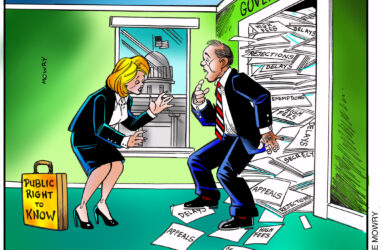The threat of paper tariffs has been a deep concern for our company and the entire newspaper industry since last fall, when one lone paper supplier, North Pacific Paper Company (NORPAC), sought protection from Canadian paper imports by filing a petition with the U.S. Department of Commerce.
A tariff is a tax or duty placed on foreign companies by the importing country as a way to essentially price fix and put economic and political pressure on the exporting country.
NORPAC’s single mill is located in Washington state and their company is owned by a New York-based hedge fund. You know, the type of business that could not care less about the newspaper industry or small town America. They claimed imported paper from Canada was hurting the U.S. paper industry, when in reality they were only driven by the self-interest of their bottom line.
Not one other U.S. paper mill supported NORPAC or its petitions for tariffs. The American Forest and Paper Industry opposes it as well because it is widely known that these tariffs will cause further damage to an already struggling newspaper industry and further reduce the demand for newsprint, threatening over 600,000 U.S. jobs.
Since November, newsprint suppliers have been adding incremental fees (three in the last four months) in anticipation of these tariffs. We don’t believe our customers should incur a price hike every time this happens, so the Black Hills Pioneer has made the decision to absorb these increases; but the question is, How much longer can we do that?
Then last week, the U.S. Department of Commerce announced their preliminary decision to side with NORPAC paper mill and called for the U.S. Customs and Border Protection to start the immediate collection of major tariffs on all Canadian newsprint imports. We have seen these tariffs reach as high as 32 percent.
North American newsprint demand has declined by 75 percent since 2000. This overall decrease in demand brought about a restructuring of the newsprint industry, resulting in the shutdown of mills or the conversion to more profitable paper production by several U.S. mills.
We’ve also seen the merger of some American newsprint supply companies with Canadian mills in order to cut expenses and have a more stable paper supply. This was not the result of unfair trade between the two countries.
But the major newsprint troubles began about 10 years ago. The recession and other market forces drove print ad revenue down, and that is a critical component to funding the local news coverage we provide. This resulted in newspapers cutting back the size of their product and tightening up their staff numbers in order to use less newsprint.
The Black Hills Pioneer’s strategy was to take the opposite approach and aggressively go after new print jobs to increase revenue and stabilize our workforce. We now print several weekly newspapers for other publishers, design and print advertising inserts for local family-owned grocery chains and provide numerous other printed products in the region.
Of course we would prefer to purchase newsprint from mills in the USA, but they don’t exist in our geographic region anymore. In order to keep our products affordable and up to our quality of standards our supply must come from Canadian mills.
Canadian mills own their forest land, providing them with a vast, reliable source for timber. This puts them firmly in control of their own renewable resource, resulting in better efficiency and lower manufacturing costs.
This prompted one very small American paper mill in Washington state to complain to the U.S. Department of Commerce that it was unfair for the Canadian mills to be shipping paper to the USA, and then the next thing you know, all paper mills are being hit with these new tariffs. If the argument is that this would save jobs and boost our economy, it’s simply not true for the newsprint industry.
So as a result, this already difficult buying situation has become even more strained. We are forced to predict our usage and order newsprint six to eight months ahead of our receiving date, if we can get it at all from our suppliers.
It’s not right for one company’s bogus complaint to impact the entire newspaper industry. These tariffs have the potential to completely devastate an already struggling newspaper industry. By tightening supply and jacking up prices, this is predicted to result in many newspapers not being able to afford newsprint, if they can even get it in the first place.
All newspaper publishers will have more tough choices ahead. Will they continue to absorb the costs, and for how long? Will they be forced to pass on the increase by raising prices for readers and advertisers?
Or will they have to start making cuts to news coverage and workforce?
Who will suffer? The American worker, citizens who value the freedom of the press, and advertisers that rely on our reaching our audience. That means all of us.
The U.S. International Trade Commission (USITC) can still stop this newsprint trade case. But we need your help. You can submit a letter to the ITC expressing your concern that these tariffs will cost jobs and hurt our communities.
Visit their website www.usitc.gov or mail a letter to them at: U.S. International Trade Commission; 500 E. St., SW; Washington, DC 20436.
You can also help by contacting your representatives in Congress, asking them to request that the ITC reject these newsprint tariffs.
Letti Lister is publisher of the Black Hills Pioneer newspaper group in western South Dakota. She also serves on the South Dakota Newspaper Association board of directors and has a journalism degree from Kansas State University.






